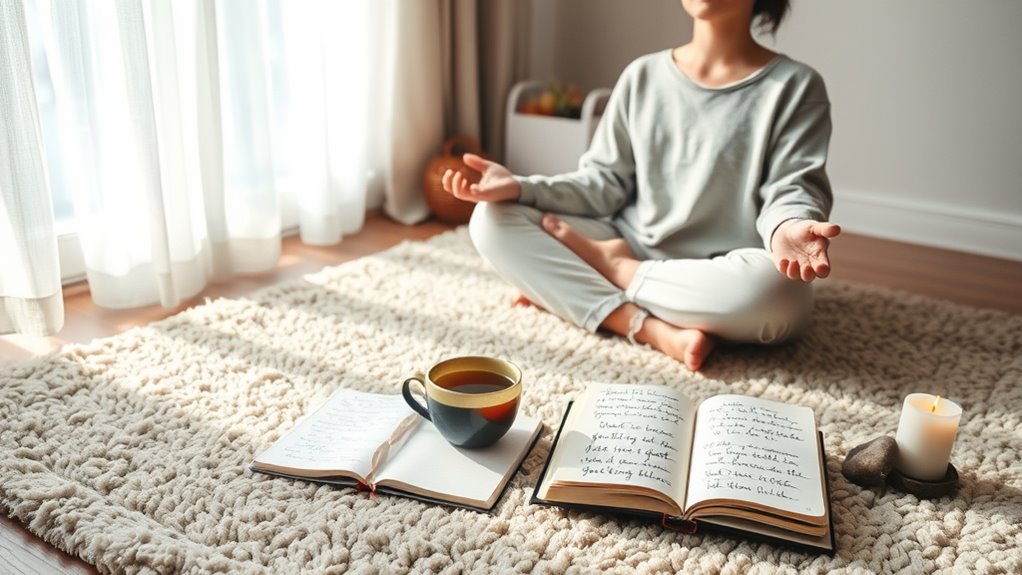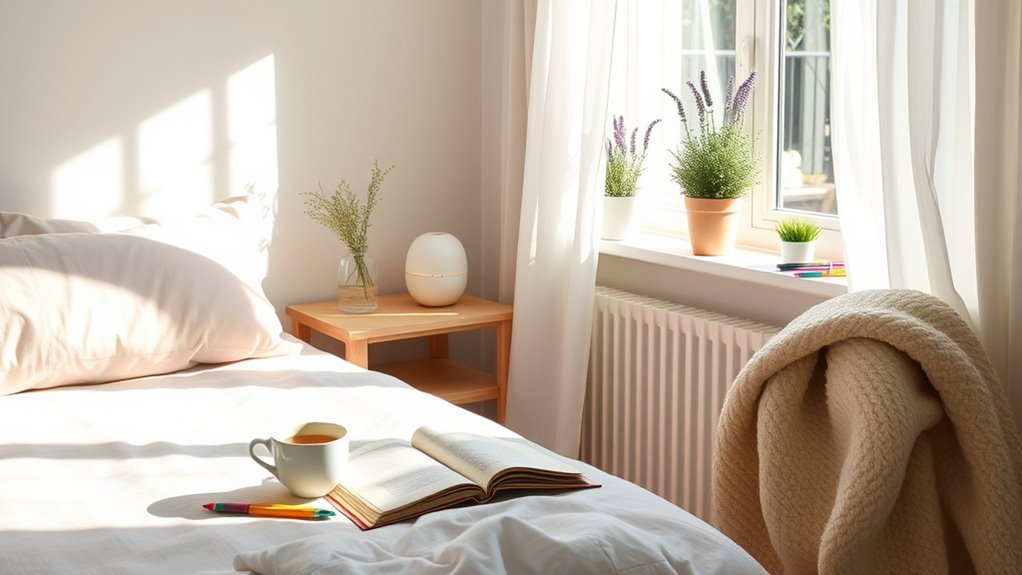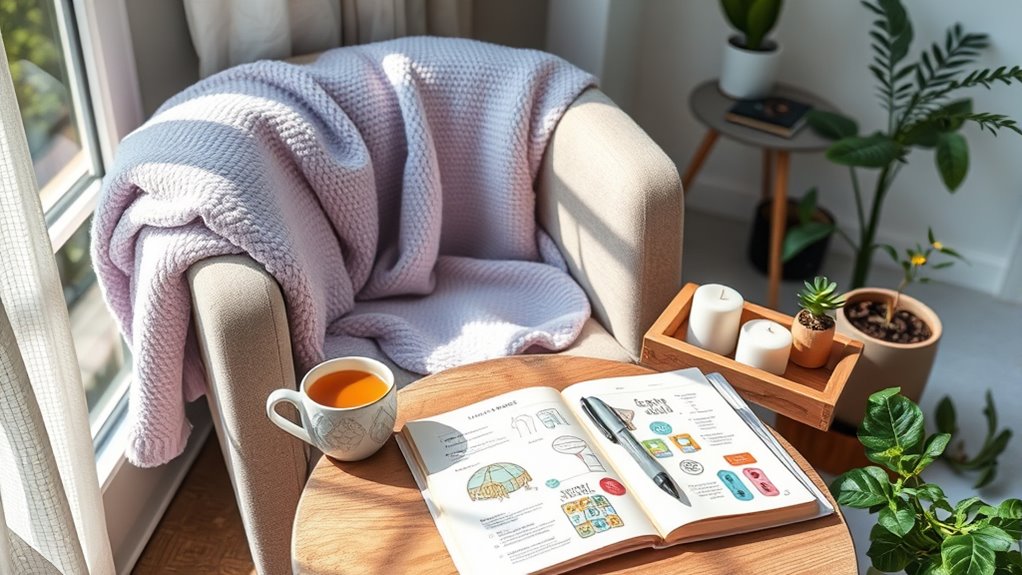Establishing consistent self-care routines is vital for managing BPD symptoms, helping you create stability and resilience. By focusing on regular habits like sleep, mindfulness, and grounding techniques, you can reduce emotional volatility and impulsivity. These routines strengthen emotional regulation over time and prevent setbacks. Personalizing your self-care plan guarantees it meets your unique needs, making it more sustainable. Keep exploring how tailored strategies can support your recovery journey and long-term well-being.
Key Takeaways
- Self-care routines stabilize emotions and reduce impulsivity, creating a foundation for emotional regulation in BPD recovery.
- Consistent practices like sleep, meals, and mindfulness build resilience and prevent emotional crises.
- Personalized routines address individual triggers, fostering sustainable and meaningful progress.
- Regular self-care enhances self-awareness and self-compassion, improving overall mental health and self-esteem.
- Maintaining routines over time strengthens emotional stability, reduces volatility, and supports long-term recovery.
Understanding the Role of Self-Care in Managing BPD Symptoms

Self-care plays a essential role in managing BPD symptoms because it helps stabilize your emotional state and reduces impulsivity. When you prioritize consistent self-care, you create a foundation for emotional regulation, making it easier to handle intense feelings and impulsive urges. Structured routines, like regular sleep, balanced eating, and exercise, help prevent mood swings and emotional crises. Physical self-care is especially important; neglecting it can worsen symptoms. Engaging in mindfulness or grounding techniques during distress moments allows you to stay present and avoid impulsive reactions. Additionally, practicing self-compassion helps counteract self-criticism, which often fuels emotional instability. Overall, self-care isn’t just about feeling good—it’s a crucial tool for maintaining stability and supporting your recovery journey.
Core Elements of Effective Self-Care Routines

Effective self-care routines incorporate several core elements that work together to support your emotional, physical, and mental well-being. First, consistency is key—you need daily practices that become habits, like regular sleep, balanced meals, and exercise. Second, self-awareness helps you recognize your needs and triggers, enabling you to respond proactively. Incorporating mindfulness and grounding techniques allows you to manage distress in real time. Third, self-compassion is essential; treat yourself with kindness, especially during setbacks. Fourth, using practical tools like mood diaries or self-care kits keeps you engaged and prepared. Finally, seeking social support and community validation reinforces your efforts and reminds you that you’re not alone. These elements form a resilient foundation for sustainable self-care that bolsters your recovery journey.
How Structured Practices Support Emotional Stability

Structured practices provide a framework that helps stabilize your emotions by creating predictability and control in daily life. When your routines are consistent, you can better anticipate your needs and manage emotional shifts more effectively. Regular schedules for sleep, meals, and activity help regulate your mood and reduce impulsivity. These routines build a sense of safety, making it easier to stay grounded during times of emotional distress. They also serve as a foundation for implementing other self-care strategies, like mindfulness or grounding techniques. By sticking to predictable patterns, you reduce the chaos that often fuels emotional dysregulation. Over time, these structured practices reinforce stability, helping you feel more secure and resilient in managing the ups and downs of BPD.
Incorporating Mindfulness and Grounding Techniques

You can use sensory focus techniques like touching textured objects or listening to specific sounds to anchor yourself in the present moment. Breathing exercises and increased awareness help calm intense emotions and reduce dissociation. Incorporating these mindfulness and grounding practices into your routine gives you quick tools to manage distress when it arises.
Sensory Focus Techniques
Sensory focus techniques serve as powerful tools for grounding and managing intense emotions in BPD recovery. These methods help you anchor yourself in the present moment by engaging your senses, which reduces emotional overwhelm. You might hold a cold object like ice or sip cold water to activate your sense of touch, or listen closely to ambient sounds to shift focus away from distressing thoughts. Clapping your hands, smelling a familiar scent, or feeling textured objects can also reorient your awareness. When emotions spike, these techniques provide immediate relief by redirecting your attention to physical sensations. Regularly practicing sensory focus helps you build resilience against dissociation and impulsivity, supporting your overall self-care routine and emotional stability.
Breathing and Awareness
Breathing and awareness techniques are essential tools for managing intense emotions and grounding yourself in the present moment. When emotions feel overwhelming, these practices help you regain control and foster calmness. Start by focusing on your breath, taking slow, deep inhales through your nose, then exhaling gently through your mouth. To deepen your awareness, try these techniques:
- Body scan: Notice sensations from head to toe, acknowledging tension or discomfort without judgment.
- Sensory grounding: Engage your senses by noticing five things you see, four you hear, three you feel, two you smell, and one you taste.
- Mindful breathing: Count each breath cycle or use a mantra to maintain focus without distraction.
These methods anchor you, helping you navigate emotional turbulence with clarity and resilience.
Overcoming Common Barriers to Consistent Self-Care

You’ll often face personal challenges like self-criticism or low self-worth that make sticking to self-care routines difficult. Emotional reactivity can cause you to abandon practices during stressful moments, but planning ahead can help you stay on track. Building consistent habits takes time and effort, but with small, manageable steps, you can overcome these barriers and strengthen your recovery.
Recognizing Personal Challenges
Recognizing personal challenges is a crucial step in maintaining consistent self-care, especially when managing BPD. You need to identify the specific obstacles that hinder your routines. These might include emotional reactivity, cognitive barriers, or unresolved trauma.
To better understand your challenges, consider these points:
- Emotional triggers that cause you to abandon self-care during distress
- Negative self-talk or self-criticism that erodes motivation
- Past experiences or trauma that create feelings of unworthiness or shame
Strategies for Emotional Reactivity
Emotional reactivity often leads to impulsive reactions that can derail your self-care routines. When strong emotions hit, you might abandon planned activities or neglect your needs, making recovery harder. To counter this, develop quick grounding techniques like deep breathing or sensory focus—such as holding ice or listening to calming sounds—to stabilize your mood. Prepare ahead by creating a crisis plan that includes specific coping strategies you can rely on during intense moments. Practice self-compassion, reminding yourself that setbacks are normal and part of recovery. Incorporate regular check-ins with yourself to recognize early signs of emotional overwhelm. Over time, these strategies help you manage reactivity better, allowing you to maintain consistency in your self-care despite emotional storms.
Building Consistent Habits
Building consistent habits in self-care can be challenging, especially when faced with common barriers like low motivation, emotional overwhelm, or conflicting priorities. To overcome these, you can:
- Break routines into small, manageable steps—focusing on one habit at a time prevents feeling overwhelmed.
- Use reminders or cues, such as alarms or visual prompts, to reinforce habits and make them automatic.
- Develop a support system—sharing goals with trusted friends or therapists increases accountability and encouragement.
Practical Strategies for Building Self-Care Habits

Establishing consistent self-care habits can feel overwhelming at first, but breaking the process into manageable steps makes it achievable. Start by identifying a few simple activities you can do daily, like drinking water, stretching, or practicing deep breathing. Use reminders or alarms to help reinforce these routines. Keep your self-care tools accessible—create a dedicated space with comforting items or a self-care box—so they’re easy to reach when needed. Incorporate activities that nourish your body and mind, such as balanced meals or mindfulness exercises. Track your progress with a journal or app, celebrating small wins to build motivation. Remember, consistency matters more than perfection, and over time, these habits will become a natural part of your recovery journey.
The Impact of Self-Care on Long-Term Recovery Outcomes

Self-care plays a crucial role in shaping long-term recovery outcomes for individuals with BPD. When you maintain consistent self-care, you build resilience, reduce emotional volatility, and strengthen your ability to manage symptoms over time. Proper routines foster stability by:
- Enhancing emotional regulation through daily practices like mindfulness and grounding techniques.
- Preventing setbacks by addressing physical health and avoiding burnout.
- Reinforcing self-acceptance, which supports healthier relationships and self-esteem.
Tailoring Self-Care Routines to Individual Needs

Since everyone’s experience with BPD is unique, tailoring self-care routines to your individual needs is essential for effective recovery. You need to identify what activities and strategies resonate with you and address your specific challenges. For example, if emotional dysregulation is a primary issue, mindfulness or grounding techniques might be most helpful. If physical health impacts your mood, prioritize regular sleep, balanced nutrition, and exercise. Recognize your triggers and develop coping strategies that fit your lifestyle and preferences. Be flexible—what works during stable periods may need adjustment during crises. Pay attention to your progress and modify your routines as you learn more about what supports your well-being. Personalizing your self-care guarantees it’s sustainable and genuinely supportive of your healing journey.
Frequently Asked Questions
How Can I Start Building a Self-Care Routine With Low Motivation?
If you’re low on motivation, start small and focus on simple, manageable actions. Set a gentle daily goal, like drinking water or taking a short walk. Use reminders or cues, like a favorite item or alarm, to prompt you. Celebrate each success, no matter how minor, to build confidence. Remember, consistency matters more than intensity—over time, these small steps can become a steady self-care habit.
What Role Does Self-Compassion Play in Maintaining Self-Care Habits?
Self-compassion plays a essential role in maintaining self-care habits because it helps you treat yourself with kindness instead of self-criticism. When you’re gentle with yourself, you’re more likely to stick with routines, even during difficult moments. Practicing self-compassion encourages resilience, reduces shame, and fosters a positive mindset that supports ongoing self-care efforts, making it easier to stay committed and bounce back from setbacks.
How Can I Adapt Self-Care Routines During Emotional Crises?
When an emotional crisis hits, you can adapt your self-care routines by grounding yourself immediately—use sensory techniques like holding ice or deep breaths. Pause and prioritize simple, calming activities, like a warm bath or listening to soothing music. Reach out for support, whether through a trusted friend or app. Remember, flexibility and gentle persistence help you navigate crises, turning overwhelming moments into opportunities for resilience and self-compassion.
Are There Specific Self-Care Practices Recommended for Trauma Survivors With BPD?
You should prioritize grounding techniques, like holding ice or focusing on sensory details, to manage trauma triggers. Incorporate gentle physical self-care, such as warm baths or stretching, to soothe your body. Practice self-compassion by acknowledging your feelings without judgment, and use safety plans to navigate intense emotions. Connecting with support groups or trusted friends can also reinforce your resilience, helping you feel less isolated during difficult times.
How Do I Balance Self-Care With Daily Responsibilities and Busy Schedules?
Did you know that people with busy schedules often neglect self-care, increasing their risk of emotional crises? To balance self-care with daily responsibilities, prioritize small, manageable routines like brief mindfulness practices or quick physical activities. Schedule self-care into your day like appointments, set reminders, and choose activities that fit your lifestyle. Remember, even five-minute breaks can boost your well-being and help you stay resilient amidst a hectic schedule.
Conclusion
Remember, prioritizing self-care isn’t just about feeling better in the moment—it’s a essential part of managing BPD symptoms long-term. Research shows that consistent self-care routines can reduce emotional crises by up to 30%. By customizing your practices and staying committed, you’ll build resilience and stability over time. Keep in mind, small daily efforts add up, empowering you to navigate challenges with greater confidence and hope on your recovery journey.









